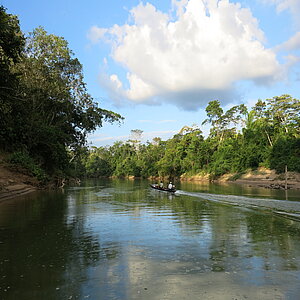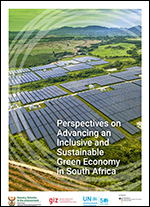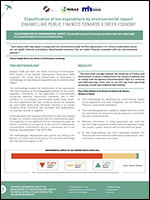Green Economy Transformation in Cooperation with the Partnership for Action on Green Economy (PAGE) – Synergies between Low-carbon Pathways and Sustainable Development Goals (SDG)
Green Economy approaches promote a competitive, environmentally friendly and socially responsible economy through sustainable agriculture, for example, renewable energies and green fiscal policies. Such approaches can contribute significantly to the coherent implementation of NDCs and SDGs. To achieve these goals, the project strengthened the competence of key actors in public institutions, enabling them to use these approaches. To this end, dialogue structures were supported and existing transformation approaches strengthened at the international level and in the partner countries. The project complemented the Partnership for Action on Green Economy (PAGE) and links national efforts with global policy networks. It also supported the Federal German Ministry for the Environment, Nature Conservation and Nuclear Safety (BMU) in its adoption of a strong role in the multilateral and bilateral Inclusive Green Economy (IGE) discussions and in positioning Germany as a pioneer and a partner.
- Countries
- Argentina, Costa Rica, Indonesia, Peru, South Africa, Uruguay
- IKI funding
- 6,000,000.00 €
- Duration
- 01/2018 till 06/2022
- Status
- completed
- Implementing organisation
- Deutsche Gesellschaft für Internationale Zusammenarbeit (GIZ) GmbH
- Political Partner
-
- Department of Forestry, Fisheries and the Environment (DFFE) - South Africa
- Ministry of Environment (MINAM) - Peru
- Ministry of Environment - Uruguay
- Ministry of Environment and Energy (MINAE) - Costa Rica
- Ministry of Environment and Sustainable Development - Argentina*
- Ministry of Finance - Indonesia
- Implementing Partner
-
- International Monetary Fund (IMF)
- The Organisation for Economic Co-operation and Development (OECD)
- United Nations Environment Programme (UN Environment) - Kenya
State of implementation/results
- Project completed.
- The project supported BMUV and PAGE in implementing political processes such as the orientation of the third PAGE Ministerial Conference in South Africa in 2019 and the establishment and implementation of the PAGE Green Recovery Fund. This further established IGE as a strategy for achieving SDGs and NDCs and strengthened Germany’s role as a global partner.-- To this end, the project promoted the implementation of national IGE approaches in the partner countries. In Uruguay, public sector officials and representatives participated in a long-term series of workshops to anchor IGE within their organisations. With the support of the project, Peru has approved a ‘Green Protocol’ for more sustainability in the financial sector. In South Africa, employees of national and municipal authorities have developed their skills in the areas of circular economy and green bonds in a series of training courses. From Argentina, a network for the promotion of socially, economically and ecologically sustainable companies has emerged in Latin America. In Indonesia, support was provided for the drafting of a law on the taxation of CO2, which was passed in October 2021.
- Together with UNEP and the International Monetary Fund (IMF), the project supported the Green Fiscal Policy Network (GFPN). At international conferences, the network has positioned environmental taxes and the reduction of environmentally harmful subsidies as an important climate finance approach in the international debate. Since 2019 till 2022, the project advised the finance ministries of Costa Rica and Indonesia on the implementation of green fiscal policy. The project supported the launch of the Oxford Global Recovery Observatory (GRO) and disseminated its findings through GFPN channels, including by means of a regional con-ference Asia-Pacific. --The project played a significant role in forming the Partners for Inclusive Green Economy, which aims to pool resources more effectively and thus accelerate global and regional economic transformation. To this end, the partners presented a joint position paper in July 2019 offering guidance for a long-term structural transition. In June 2020, a document detailing the priorities for green recovery from COVID-19 was published and in November 2021 a discussion paper on transformational pathways submitted to the OECD green forum.
- To strengthen international knowledge exchange, the project supported a GGKP series of web seminars in 2020 on the topic of ‘Sustainability after COVID-19’. It also teamed up with GFPN to organise a seminar on ‘Fiscal Policies to Green the Recovery’ and a further seminar on green workplaces in South Africa and Argentina. In a virtual storytelling process, people from four partner countries shared personal experiences of shaping a green economy, which were published on the Green Policy Platform.
Latest Update:
03/2025
Further links
- Online seminar: ‘Sustainability after COVID-19: Fiscal Policies to Green the Recovery’
- Online seminar ‘Measuring What Matters: A new Methodology for Collect-ing and Reporting Data on Fossil Fuel Subsidies’
- Sustainable infrastructure: Investing in a sustainable future with ‘green bonds’
- News: GO4SDGs initiative makes the case for green recovery solutions to support MSMEs
- Online seminar: 'We're Here to Help: Free policy advisory services for a greener economy'
- Blog: "Empowering agents for change - Continuous support pays out for good governance"
- Online seminar: Green jobs for a better future
Project relations
Legend:
The link has been copied to the clipboard



















